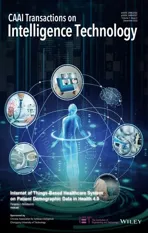Guest Editorial:Special issue on recent developments in advanced mechatronics systems
2023-01-05
This Special Issue will accept contributions describing innovative research and developments in‘Advanced Mechatronic Systems’,and will cover a wide range of disciplines,including robotics,automation and control systems,and new energy systems.It particularly welcomes those emerging methodologies and techniques which bridge theoretical studies and applications in advanced mechatronic systems.Novel quantitative engineering and science studies may be considered as well.
Topics of interest include,but are not limited to:
·AI,big data,intelligent computation,and their applications.
·Signal and image processing and pattern recognition in mechatronic systems.
·New energy systems,simulation and optimisation.
·Intelligent fault diagnosis and tolerance of mechatronic systems.
This Special Issue focuses on these topics and selects high‐quality research papers to be published.The first paper presents a hysteresis mathematical model of s shape memory alloy actuator for feedforward hysteresis compensator[1].The second paper proposes an ensemble model of ordinal classification based on neural network with ordered partitions and Dempster‐Shafer theory[2].The third paper introduces the shapelet transformation is proposed to calculate the parameter of one‐dimensional ternary model which is for feature selection[3].The fourth paper derives a parameter optimisation strategy of control systems for uncertain WPT systems using the modified genetic algorithm[4].The fifth paper proposes a design scheme to guarantee the uncertain non‐linear systems to be robustly stable while the equivalent non‐linear systems is passive[5].The sixth paper designs a humanoid sliding model neural network controller based on the human gait[6].The seventh paper applies the exponential smoothing method to process the initial data,calculates the relevant technical indicators as the characteristics to be selected,and proposes the D‐RF‐RS method to optimise random forest[7].The eighth paper studies to construct an early Japanese book re‐organisation system by combining image processing and deep learning techniques[8].
Given these diverse contributions,this special issue brings some novel findings and gives many hits for future research.Finally,the Guest Editors would like to sincerely thank all the authors for their valuable contributions and the IET staffs for their kind assistance.
CONFLICT OF INTEREST
All authors declare that they have no conflicts of interest.
Correspondence
Lin Meng,Department of Electronic and Computer Engineering,Ritsumeikan University,Kusatsu,Japan.
Email:menglin@fc.ritsumei.ac.jp
DATA AVAILABILITY STATEMENT
All data generated or analysed during this study are included in this published article.
ORCID
Lin Menghttps://orcid.org/0000-0003-4351-6923
Mingcong Denghttps://orcid.org/0000-0001-7411-6602
Shengjun Wenhttps://orcid.org/0000-0002-6439-8375
杂志排行
CAAI Transactions on Intelligence Technology的其它文章
- CORRIGENDUM
- Modelling of a shape memory alloy actuator for feedforward hysteresis compensator considering load fluctuation
- Apple grading method based on neural network with ordered partitions and evidential ensemble learning
- An improved bearing fault detection strategy based on artificial bee colony algorithm
- Parameter optimization of control system design for uncertain wireless power transfer systems using modified genetic algorithm
- Passive robust control for uncertain Hamiltonian systems by using operator theory
